Effective time management at work — the elusive dream we’re all chasing. Ever have one of those days where you’re left looking at a barely checked-off to-do list by the time night rolls around? You’re not alone. In today’s environment, where meetings stack up, notifications bombard us, and social media lures us, managing your time effectively isn’t just a skill—it’s a survival strategy
But guess what? We’ve cracked the code. We’ve dug up 18 transformative time management strategies that will redefine your approach to time management in your professional life.
Gone are days of scrambled deadlines, unchecked to-do lists, and that sinking feeling of underachievement. Instead, you’ll be meeting your goals head-on, earning respect from colleagues, and closing each workday with a gratifying sense of accomplishment.
But let’s first understand why time management is so important and how you can determine if you need to improve your time management.
Why Is Time Management Important?
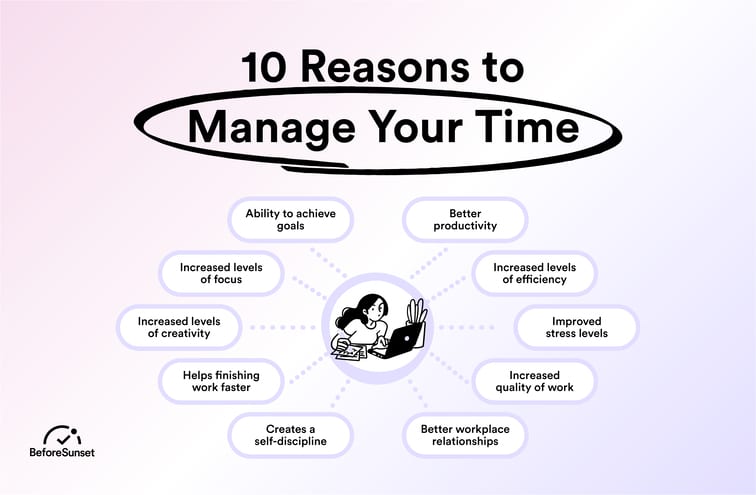
10 Reasons to Manage Time
Image Source: BeforeSunset AI
Time management is like a mirror, showing you how you’re spending your hours and highlighting areas where you can tweak things a bit. Ever feel like you’re always behind on deadlines or working late? Well, keeping tabs on how your day goes can help you notice those repeating time-eaters and you might just be able to whip up a solid plan to beat them.
You want to start by carving out some quality time for your big business goals. Hence, sketch out your day and ensure the tasks that really count aren’t left on the back burner. This is a guaranteed method to kick your productivity into high gear.
Think about using time-tracking apps. They’re like your personal time coaches, keeping tabs on what you’re doing and giving you the lowdown on your work habits. In the same way, a time log can help identify time wasters and areas where you can improve time allocation.
Why not try setting a few goals for the week or the month and then watch how you start moving forward? Look at things like:
- How long do you normally take on a task
- Whether you’re regularly burning the midnight oil
- Are you spending more time on urgent tasks or everyday ones
- What about your top-priority jobs versus the not-so-critical ones
- How often do interruptions in your personal life throw you off your game
You know, by comparing these, you’ll get a clear view of how good you’re getting at handling your time. All these insights are golden nuggets for understanding your work style, spotting bottlenecks, and crafting a more streamlined approach to your tasks. The bonus? You’ll likely feel less stress, work, and life finally playing nice, and your career taking off.
18 Effective Time Management Hacks You Should Try
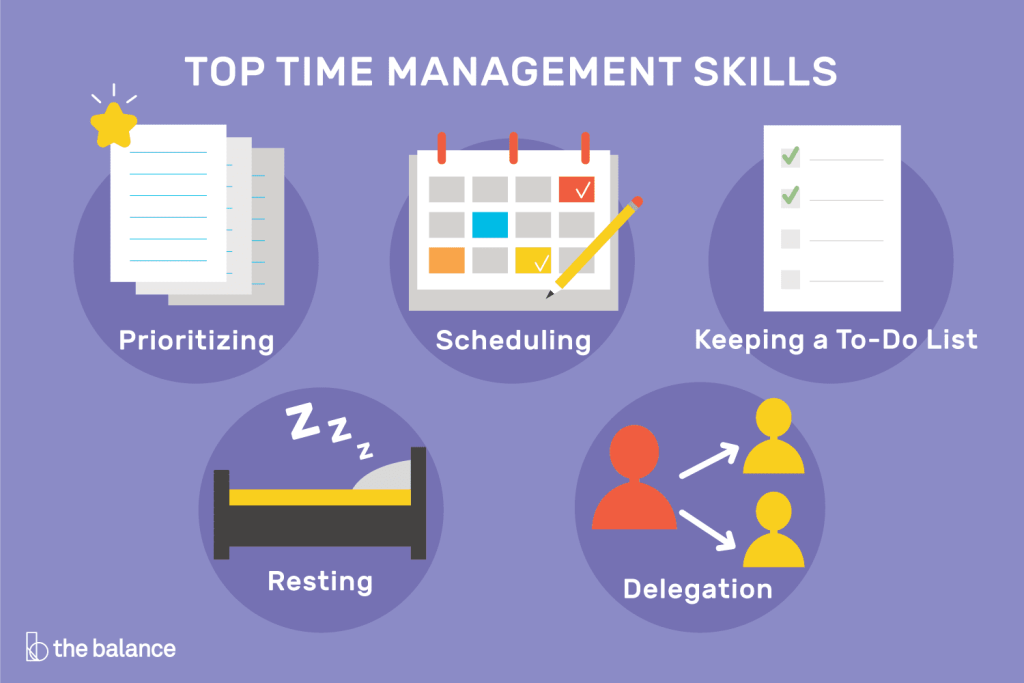
Top Time Management Skills
Image Source: The Balance
1. Master The Art Of Scheduling
Thoughtful planning is a cornerstone of effective time management. Give yourself a moment to lay out your tasks. This involves jotting down tasks, setting deadlines, and estimating the time limit for each, including allocating blocks of time for challenging tasks and manageable tasks.
Identify your most productive time slots and schedule important tasks during those periods. You can chalk out a plan for each day and then roll with a well-organized weekly schedule to get the best out of your time. When allocating time for activities, consider the time constraints for each task and set measurable goals to track your progress effectively.
Let’s visualize it like this – say you’re a writer for a lifestyle fashion and jewelry blog like Writer Alpha. You have to curate content to catch the eye of your fashionable readers, research the latest lifestyle trends and jewelry, write, edit, and then publish.
Of course, in between these blocks, you have chunks of time for deep work, meetings, and even breaks. Yes, breaks are important too. With such a clear, block-by-block organization of your tasks, you can reduce that overwhelming feeling that comes when your to-do list seems endless.
The more detailed your schedule, the easier it is to allocate time effectively, avoid overcommitting, and manage your workload. The plan acts as a roadmap, guiding your actions and decisions. By incorporating contingency time for unexpected tasks or complications, you’re better equipped to handle disruptions without sacrificing other tasks.
2. Make Prioritization A Priority
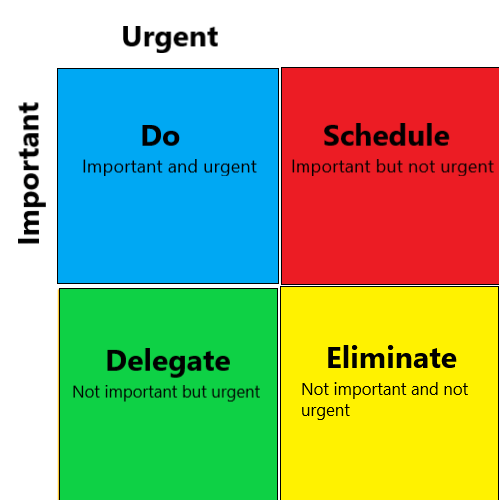
Prioritization
Image Source: Time Doctor
Prioritization is more than a daily to-do list; it’s a critical assessment tool. When you’re trying to figure out which tasks are super important and which ones can wait a bit, the Eisenhower matrix can help you out. At its core, it’s about organizing your tasks by their significance and how fast they need to be ticked off.
However, this approach doesn’t apply to all situations. Your tasks, goals, and timelines determine your prioritization process. It’s not merely about sorting tasks; it’s about investing your time where it matters most, repeating the benefits of time management.
Eliminating time spent on low-impact tasks and daily tasks creates more room for significant task completion and propels you to your key objectives.
3. Time Management Audits Are Essential
Think of them as a handy mirror that reflects where every minute of your day goes. Just jot down all the stuff keeping you busy during the day and keep track of how much time each task eats up.
Trust me, this can be a jaw-dropper, especially if you’re wearing the entrepreneur hat or steering your startup and aiming to nail financial metrics. It’s like switching on a floodlight—you suddenly see patterns and get a clear picture of how your time is spent.
With this knowledge in your mind, you’re in the driver’s seat. You can mix things up a bit—nudge here, tweak there. Focus on the tasks that drive results and kick out the ones just chewing up your time. Regular time audits keep you alert to your habits, making it easy for you to meet your tight deadlines and adjust as you go along.
4. Minimize Workflow Interruptions
Imagine a world with zero distractions—how awesome would that be? We could focus on what truly matters without any interruptions. But let’s be real, distractions are everywhere. So, what do you do? You create your little productivity bubble.
It could mean finding a quiet spot, using noise-canceling headphones, or switching off digital notifications. You could even use apps to track and monitor important distractions that cannot be ignored, like looking after loved ones with medical conditions.
For example, using one of the best GPS trackers for dementia patients can make sure they’re safe without pulling you away from your tasks. You decide what works best for you. Don’t forget to establish ‘do not disturb’ periods for focused work. Interruptions can disrupt your flow, and regaining focus can be a challenge.
Cut out the distractions in your daily life, and you’ll see how smoothly your workflows are.
5. Master The Skill Of Delegation
Delegating is a total game-changer, especially when you’re drowning in work. The trick is all about matching the tasks with the right pair of hands. You’ve got to be crystal clear about the what, the when, and the who of every task.
Suppose you’re running an online store like ShopSolarKits, selling all kinds of cutting-edge tech gear. You’ve got everything from innovative solar panels to high-tech items like inverters. Your plate is piled high with tasks – from keeping tabs on inventory, freshening up product descriptions, and fielding customer queries, to getting the word out about your store.
To crank up your efficiency, you might give the inventory tasks to someone with killer organizational skills. You could also pass the product description task to someone who knows how to spin a sentence and gets the tech details of solar panels. Sure, it might feel a bit weird at first, letting others take over tasks. But once you get the swing of it, you’ll notice a huge change in your workload.
Suddenly, you’ve got dedicated time for the things that need your personal touch. Delegation is not just about getting stuff done faster, it’s also about building a strong team and boosting skills.
When team members step up to new tasks, their confidence rockets, and morale gets a major boost.
6. Champion Single-Tasking
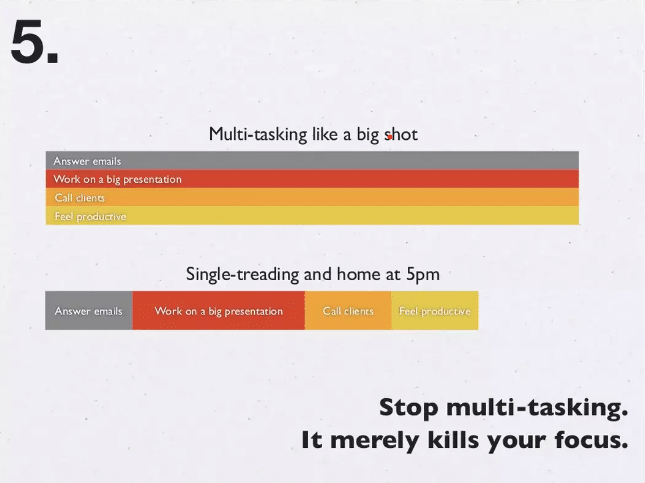
Champion Single-Tasking
Image Source: Business Insider India
While multitasking might seem efficient, it often causes errors and increases task completion time. Single-tasking, on the other hand, advocates for dedicating your complete attention to one task at a time.
This focus allows for deep work—undistracted, highly focused effort—and reduces the cognitive overload caused by constant task-switching. Single-tasking fosters a higher quality of work, speed, and a deeper understanding of tasks.
7. Schedule Important Tasks For The Morning
For many, mornings present a unique window of heightened focus and energy. Tackling your most critical tasks first thing in the morning harnesses this potential.
By front-loading your day with key tasks, you’re not only leveraging your prime time, but you’re also creating a safety net for unforeseen disruptions later in the day.
8. Recognize When To Call It A Day
We can easily get sucked into the grind, but knowing when to hit the brakes is just as crucial. Work-life balance isn’t just a catchphrase; it’s a necessary element for sustainable productivity. Recognizing your limits, setting boundaries, and knowing when to step away from work not only prevents burnout but also fosters creativity and rejuvenation.
9. Incorporate Breaks Between Tasks
Just like an athlete needs recovery time between workouts, your mind needs breaks between tasks. Structured pauses, often known as ‘pomodoros,’ act as mental recovery intervals, enhancing focus and preventing fatigue.
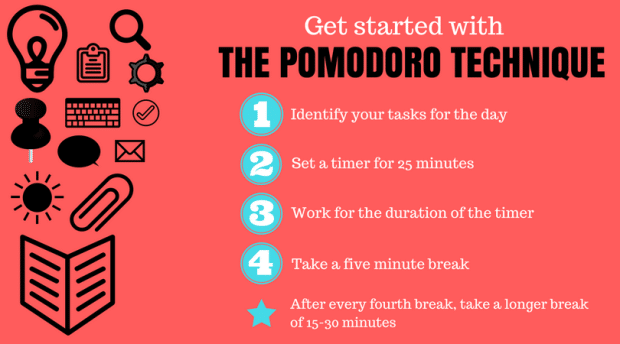
The Pomodoro Technique
Image Source: Merixstudio
Regular breaks between tasks can help maintain productivity and reduce stress levels. Time management experts recommend incorporating leisure time into your schedule to recharge and make the most of your productive time.
By mixing in short, planned breaks, you maintain a steady rhythm of productivity and ensure you’re consistently performing at your best.
10. Identify Your Productive Rhythm
Everyone works differently, and understanding your work rhythm can make a world of difference in your productivity. Whether you’re a morning lark, a night owl, or somewhere in between, knowing your peak productivity hours aligns your most demanding tasks accordingly.
11. Establish Clear Meeting Objectives
A common time sink in the workplace is poorly structured, aimless meetings. To combat this, set clear, achievable goals for each meeting. Provide a concise agenda beforehand and ensure discussions stay on track.
One of the aspects often overlooked when it comes to meetings, especially in global organizations, is the challenge of coordinating with overseas operators. Having the right people in the right roles, understanding cultural nuances, and managing time differences are just some aspects to consider. These factors can streamline your process and enhance overall meeting productivity.
Encourage participation, but also value brevity. You not only save time but also make sure that each meeting yields actionable outcomes, making them productive and meaningful. With clear objectives, every participant knows their role, what needs to be achieved, and the steps needed to reach the meeting’s goals.
12. Mastering The Art Of Saying No To Extra Tasks
We’re all superheroes in our own ways, but that doesn’t mean we have to take on the world all the time. Sure, it’s tempting to nod ‘yes’ to every task. But doing so can lead you straight into stress city. So, learn how to politely and firmly say ‘no’ to additional tasks when your plate’s already full.
Remember, it’s not about evading responsibilities. It’s about ensuring your workload is balanced and manageable. Saying ‘no’ isn’t negative; it’s about preserving your energy and focus for the tasks at hand.
13. Uphold The Sanctity Of Vacations And Weekends
Vacations and weekends are sacred. They’re your time to recharge, reset, and rejuvenate. Working non-stop, even on your days off, can wear you down and throw your work-life balance out of whack.
Think about it. You need this time to refresh your mind and rekindle your motivation. To reap the benefits of time off, you need to establish a firm line between work and leisure. Trust me, when you return to work after a real break, you’ll be more focused, less stressed, and ready to tackle anything.
14. Regularly Analyze Your Daily Routines
Analyzing your daily habits is like shining a spotlight on your productivity. It helps you sort out what’s hitting the mark and what’s falling flat. Break your day into chunks, assess each activity, and see which ones are helping you be productive and which ones are just a time-suck.
This can provide you with valuable data on what’s working well and where improvements can be made. Through regular self-evaluation, you become more self-aware, allowing you to optimize your activities for maximum productivity. Remember, your daily routine is a tool. Use it to work smarter, not harder.
15. Harness The Power Of Top-Rated Productivity Apps
Isn’t it great how tech comes to the rescue when we need to manage our time? Loads of apps are out there, ready and waiting to help you line up tasks, ping you with reminders, and track how much you’re nailing productivity-wise.
For instance, if you are a developer or a data engineer working with MongoDB databases, the Mongodb Change Data Capture feature Estuary offers could be particularly useful. This tech is super sharp, spotting any shifts in your data the moment they occur. That means you can react and make decisions instantly.
It’s like having a personal assistant that alerts you to significant data changes as they occur, helping you prioritize tasks effectively and manage your time more efficiently.
These apps are like your personal time detectives, tracking how you’re using your hours and offering insights to help you make smarter, data-backed decisions. So, leverage the power of these apps and gain control over your time and productivity.
16. Incorporate Physical Activity Into Your Daily Routine
Sneaking exercise into your daily routine may seem insignificant, but its impact on productivity is substantial. Regular physical activity can enhance your mood, improve your focus, and boost your energy level. Even short bursts of movement during the day can give significant benefits, contributing to effective time management.
The idea is to make physical activity an integrated part of your routine, not an interruption. As you weave exercise into your daily rhythm, you’ll start to see your productivity take a jump, and you’ll just generally feel a whole lot better.
17. Infuse Variety Into Your Daily Schedule
Repetition can get monotonous and sap your energy. Shake things up. Inject variety into your routine to keep your brain stimulated and motivation levels high. It could be as simple as changing the order of tasks or trying something new.
For example, let’s say you’re in the supply-sourcing business that supplies high-quality ingredients. You can shuffle your routine by changing how you inspect different ingredient categories or varying the method by which you conduct market research for new suppliers.
This will not only make your day more engaging but also expose you to different aspects of your job that you might not have explored otherwise. You could also take some time to learn about the different industries that your company serves.
Getting the hang of the different demands and hurdles in these various industries can help you bring your A-game to your job. Plus, it’s a great way to keep things fun and interesting. Don’t let the same old routine get you down and drain your energy.
When you mix up your day with a bunch of different things to do, you’ll see that your excitement and productivity levels keep on rolling steadily.
18. Periodically Alter Your Work Environment
Ever heard the saying, a change is as good as a rest? Shaking up your work environment can do wonders for your productivity. It can be a simple tweak like rearranging your desk or a more significant change like working from a coffee shop instead of home.
Consider this: you might even decide to take your work on a trip, changing not just your work setting but your whole environment. With platforms like Google Flights, you can snag a flight to somewhere you’ve never been, and voila – you’re tapping away at work with a whole new view.
Who knows? A beach town, a mountainous region, or even a bustling city could be the next place that inspires your best work. This newness can spark creativity and motivation, breaking the routine and injecting fresh energy into your work. So, now and then, try a new work environment. You might be surprised at the boost in productivity you experience.
Conclusion
Time management is all about striking the right balance between work and play, urgency and importance, focusing, and relaxing. It’s about organizing your tasks efficiently so you can achieve more without feeling overwhelmed.
By now, you should have a whole toolbox of hacks to rock each day like a pro. But here’s the deal – knowing these time management techniques is just the beginning. The real magic comes from putting them into practice consistently and refining your approach as you go.
All these time management methods come down to one golden truth: when you master your time, you master your life. So start small, try out some of these effective time management strategies, and gradually add more to your repertoire.
If you want to take your time management skills up a notch, check out WebWork Tracker. It’s a comprehensive tool that keeps tabs on your work hours, helps you stay on top of tasks, and gives you a clear view of your productivity.
Time management is an ongoing journey, not some final destination. As you grow and face new challenges at work, these effective time management skills will always be your trusty companions.
Author Bio

Burkhard Berger is the founder of Novum™. He helps innovative B2B companies implement revenue-driven SEO strategies to scale their organic traffic to 1,000,000+ visitors per month. Curious about what your true traffic potential is?

